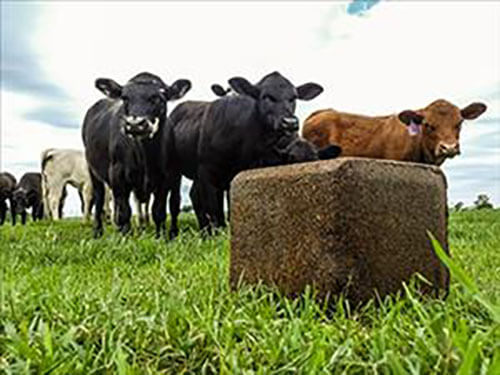Supplementing Cattle with Pressed Blocks
Jan 27, 2020

Winter beef cattle feeding programs in the Southeast are typically based upon stored hay. While considered a necessary practice, increasing input costs make it an expensive one as well. Frequent rains and rapidly maturing forages in the spring can also mean at least a portion of our hay inventory is lacking in quality. Feeding this poor-quality hay can result in decreased cattle performance and reduced profit for your beef cattle operation. Supplemental nutrition can correct this deficiency.
Cattle are ruminant animals and rely on the microorganisms that live in their digestive tracts to glean nutrition from ingested forages. When supplementing cattle, consideration must be given to how the supplement affects these rumen microorganisms. Effects can be positive, aiding the microbes in being more efficient and getting more nutrition from the forage. Conversely, supplementation with improper feedstuffs may produce negative effects and cause a decrease in forage utilization and feed efficiency. Supplementation programs should be selected to provide mutual benefits to the cattle and their rumen microorganisms, resulting in improved performance.
Co-op Supreme Cattle Supplement blocks are a great way to provide a “boost” to these microbes without the negative effects. Formulated with both plant protein and non-protein nitrogen, they provide microbes with extra nitrogen that allows them to flourish. Studies have shown that providing as little as 1/4- lb. of additional protein to cattle daily can increase fiber digestion by 30 percent. These products can improve intake of poor-quality hay and allow the animal to derive more energy from the hay consumed.
In addition to protein, Co-op Supreme blocks provide a full complement of vitamins and minerals so that no additional salt or mineral is necessary. Hay is often deficient in essential mineral elements such as phosphorus, copper, zinc, and selenium. Providing these in the proper amounts and ratios can have a positive impact on the growth, reproduction, and health of beef cattle. A high magnesium block is also available when grass tetany is a concern.
Co-op Supreme blocks are also very cost-effective when compared to other sources of protein. Lack of fillers, carriers, or expensive packaging translates into more nutrition for your dollar spent. Their self-fed formulation also means a savings in both time and labor. When offered free-choice, the salt content and physical hardness of the block normally limits intake to 1-2 lbs. per head per day. And, the 33.3-lb. size allows for safe handling, transportation, and feeding by most anyone.
Convenience, cost-effectiveness, and consistent access are just some of the attributes of Co-op Supreme Cattle Supplement blocks. Let the beef cattle experts at your Co-op help you determine if pressed blocks are the answer to your winter supplementation needs.
Cattle are ruminant animals and rely on the microorganisms that live in their digestive tracts to glean nutrition from ingested forages. When supplementing cattle, consideration must be given to how the supplement affects these rumen microorganisms. Effects can be positive, aiding the microbes in being more efficient and getting more nutrition from the forage. Conversely, supplementation with improper feedstuffs may produce negative effects and cause a decrease in forage utilization and feed efficiency. Supplementation programs should be selected to provide mutual benefits to the cattle and their rumen microorganisms, resulting in improved performance.
Co-op Supreme Cattle Supplement blocks are a great way to provide a “boost” to these microbes without the negative effects. Formulated with both plant protein and non-protein nitrogen, they provide microbes with extra nitrogen that allows them to flourish. Studies have shown that providing as little as 1/4- lb. of additional protein to cattle daily can increase fiber digestion by 30 percent. These products can improve intake of poor-quality hay and allow the animal to derive more energy from the hay consumed.
In addition to protein, Co-op Supreme blocks provide a full complement of vitamins and minerals so that no additional salt or mineral is necessary. Hay is often deficient in essential mineral elements such as phosphorus, copper, zinc, and selenium. Providing these in the proper amounts and ratios can have a positive impact on the growth, reproduction, and health of beef cattle. A high magnesium block is also available when grass tetany is a concern.
Co-op Supreme blocks are also very cost-effective when compared to other sources of protein. Lack of fillers, carriers, or expensive packaging translates into more nutrition for your dollar spent. Their self-fed formulation also means a savings in both time and labor. When offered free-choice, the salt content and physical hardness of the block normally limits intake to 1-2 lbs. per head per day. And, the 33.3-lb. size allows for safe handling, transportation, and feeding by most anyone.
Convenience, cost-effectiveness, and consistent access are just some of the attributes of Co-op Supreme Cattle Supplement blocks. Let the beef cattle experts at your Co-op help you determine if pressed blocks are the answer to your winter supplementation needs.